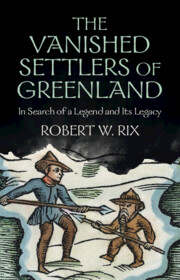Book contents
- The Vanished Settlers of Greenland
- The Vanished Settlers of Greenland
- Copyright page
- Contents
- Figures
- Acknowledgements
- Introduction
- Prologue The Medieval Settlements in Greenland
- 1 Land of Wealth and Violence
- 2 Greenland and Discourses of Possession
- 3 Beyond the Horizon
- 4 1818
- 5 Greenland’s Fall and Restoration
- 6 The Surpassing Adventures of Allan Gordon
- 7 Arctic Adventure Tales
- 8 Vanished Settlers
- Conclusion
- Notes
- Bibliography
- Index
Conclusion
Published online by Cambridge University Press: 01 June 2023
- The Vanished Settlers of Greenland
- The Vanished Settlers of Greenland
- Copyright page
- Contents
- Figures
- Acknowledgements
- Introduction
- Prologue The Medieval Settlements in Greenland
- 1 Land of Wealth and Violence
- 2 Greenland and Discourses of Possession
- 3 Beyond the Horizon
- 4 1818
- 5 Greenland’s Fall and Restoration
- 6 The Surpassing Adventures of Allan Gordon
- 7 Arctic Adventure Tales
- 8 Vanished Settlers
- Conclusion
- Notes
- Bibliography
- Index
Summary
The chapters in this book have examined how the memory of the colony ‘at the end of the world’ became an enduring reference point in the Western imagination. I will now summarise the key findings and offer a final synthesis of the central ideas. The Norse colony in Greenland was remembered as a lieu de mémoire – a cultural heritage proudly seen as an extension of Christian Europe, marking an outpost of civilisation and the success of colonisation. Its loss was seen as an amputation. In the centuries after communication was discontinued, Greenland took on an important role in the collective memory of the West and the idea of ‘Greenland’ as a land of wealth and violence was constructed through an array of historiographical, scientific, and popular texts. In this way Greenland was more than a geographical entity; it became a conceptual space.
- Type
- Chapter
- Information
- The Vanished Settlers of GreenlandIn Search of a Legend and Its Legacy, pp. 312 - 322Publisher: Cambridge University PressPrint publication year: 2023

